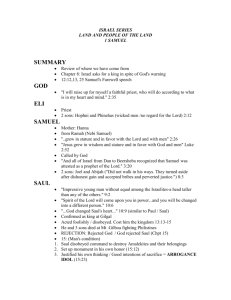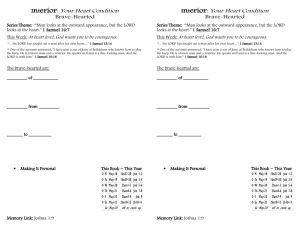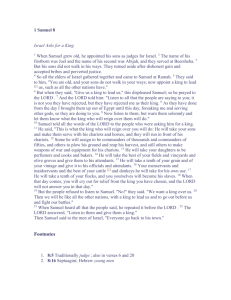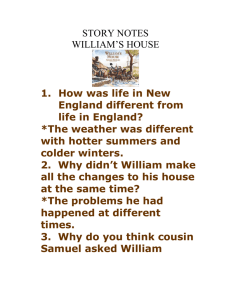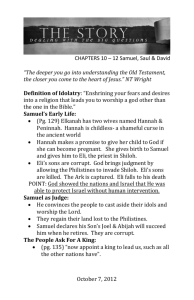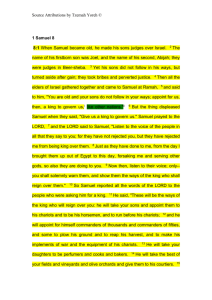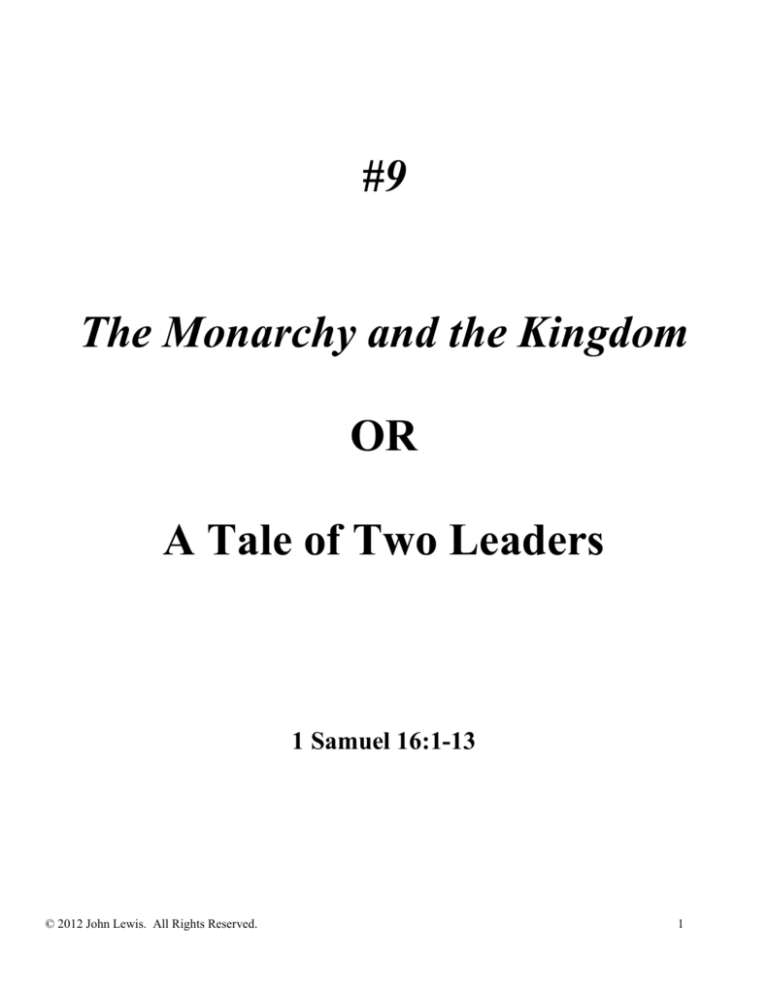
#9
The Monarchy and the Kingdom
OR
A Tale of Two Leaders
1 Samuel 16:1-13
© 2012 John Lewis. All Rights Reserved.
1
#9:
The Monarchy and the Kingdom
INTRODUCTION
Brief Overview of Today’s Story: After Saul’s brief and unsuccessful reign as Israel’s first king, Samuel was now called
to anoint David, Jesse’s youngest son, as Saul’s replacement and a king “after God’s own heart.”
Summary Verse:
But the Lord said to Samuel,
“Do not look on his appearance or on the height of his stature,
because I have rejected him;
for the Lord does not see as mortals see;
they look on the outward appearance,
but the Lord looks on the heart.”
-1 Samuel 16:7
Introduction to Today’s Story and Themes:
After Mt. Sinai, God’s people spent forty years meandering in the wilderness between Egypt and Canaan. Once
God used Joshua to lead the next generation into the Promised Land, God was to be their king and leader. Yet the people
fell and wandered again…this time fruitlessly trying to live in the wilderness of their own creation, in the “no man’s land”
between loyalty to Yahweh and to other gods. Another name for it is chaos. The last sentence of the book of Judges,
sums it up nicely: “in those days there was no king in Israel; every person did what was right in their own eyes.” (21:25)
Without consistent leadership, human or divine, the people were destined to live in a miserable cycle of rebellion,
retribution, repentance, and a mere surface restoration with God.
Having come to the end of their rope, the people asked Samuel, the last judge, for a “secular solution,” a human
safety net and a real live leader whose voice they could hear and whose stature they could admire: “We want a king,
because that is what all the other nations have.” Though they had ratified a covenant of loyalty at Sinai and declared God
to be their supreme king, the common people craved a king with skin on.
God and Samuel first resist and then concede to their request, albeit with premonitions and warnings. A king
Israel then does receive, two in fact. The first is Saul, and the second is David.
How these two kings were chosen and called, how they began their rule as kings, how these two were similar and
different, matter a great deal for the biblical story of Israel and the ongoing narrative of leadership in our community and
organizations. From their coronation and their relationship we learn valuable lessons in our own calling, submission to
authority and the nature of humility and pride in leadership.
“The book of Judges is a record of revivals. The history of God’s people is one of repeated backsliding, with God
choosing one here, one there, as His instruments to bring recovery. But is this His real purpose for them? Are we today
to expect another revival? Certainly our thoughts turn that way. But God intends something different. God’s eyes are
towards a kingdom. He is planning for a King.”
Watchman Nee
© 2012 John Lewis. All Rights Reserved.
2
SETTING UP THE STORY: An overview of 1st/2nd Samuel
First and Second Samuel provides a history of Israel from the end of the judges to the last years of David.
Samuel was the connecting link between Judges and the beginning of the monarchy/kings. It is here that we meet David
and discover how he came to fame. The Old Testament is the story of God’s dealing with the Hebrew Nation for the
purpose of one day blessing all nations. As the story unfolds, it is explained that the way the Hebrew nation would bless
all nations would be through the family of David.
Samuel’s parents were Levites. His mother, Hannah, was barren and prayed desperately for a child. When Samuel
was born, Hannah recognized what an amazing gift he was and dedicated him to serve at the tabernacle at the age of three.
Samuel lived, “grew in wisdom and stature,” and learned to serve God and hear his voice with the priest, Eli. (1 Samuel,
ch. 1-2).
Samuel was involved with the change in government from judges to a king. In the Kingdom of Israel, the offices
of king and priest were kept separate. Samuel was also seen as a prophet. He was the last judge, the first prophet, and the
founder of the monarchy. (Other oral prophets that followed soon after Samuel are Nathan, Ahijah, Elijah, and Elisha.)
Samuel was called by God to be a prophet and priest, and relayed the word of God to the people. (3) During the
early years of Samuel’s ministry, the Philistines captured the Ark of the Covenant. When the Philistines began to have bad
things happen to them, they assumed it was because they had stolen the ark, so they returned it to Israel. (4-6)
Under the judges of Joel and Abijah, Samuel’s sons, the people of Israel began complaining. They demanded that
Samuel appoint a human king for them. They desired to be like all the other nations. The Lord spoke through Samuel and
warned them of what a human king would bring (oppression, slavery, etc.) but the people “refused to listen.” (8) The
Lord granted their request and Saul was anointed as the first king of Israel.
Saul was from the smallest clan of the tribe of Benjamin. He was a strong warrior and stood a “head taller than
any of the others,” yet he hid in the baggage when his time came to be coroneted. After Saul was anointed he defeated the
Ammonites. (9-11) The people followed Saul as their king. But eventually, Saul began to misuse the power of his
position. He made sacrifices on his own instead of waiting for Samuel.(13)
Saul became increasingly inconsistent and irrational in his decisions. He ordered a death sentence on his son,
Jonathan, because he disobeyed the ridiculous order for the army to abstain from food. (14) He became a king that was
rash, fearful, and jealous, especially with David. After 42 years of kingship, the Lord rejected Saul as king. “Because you
have rejected God, God has rejected you from being king.” (15) Saul eventually ended his own life, a lonely and jealous
man, a man rejected by God. (31)
David, still a shepherd while Saul was king, was anointed to be the next king by Samuel. As a small boy, David
defeated the giant, Goliath, with “only” a slingshot. (17) Saul called David into his household to be a soldier in his army.
This young man had great physical strength, was prudent in speech, courageous on the battlefield, gifted musically and
deeply religious. Saul thus became jealous of David because the people seemed to like David better. Feeling David was a
threat to his power, Saul plotted to kill David. David escaped his ploys every time, though he could have easily killed
Saul. (18-20) Even Saul’s son, Jonathan, helped David escape from his father’s murder attempts. David and Jonathan had
become very close covenant friends and Jonathan knew that his father was acting crazy. (20) David often showed that his
moral character was superior to Saul’s. Even when he had the opportunity, he refuses to kill Saul and spares his life; his
reverence for Saul as God’s anointed led him to submit to this tyrant king even at great personal cost. (24)
After the death of Saul, David was anointed king over Judah, and eventually over Israel as well. (2 Sam. 2) In a
special new covenant, God promises David that his throne would go on forever. (7) With this faithful promise on his
shoulders, David makes Jerusalem the capital of Israel, moves the ark there, and plans to build the temple. (8-10)
But even a king, a man after God’s own heart, can make huge mistakes. David commits adultery with Bathsheba
and then sends her husband out into the front line of battle to kill him. (11) The prophet, Nathan rebukes David’s sin upon
instruction from Yahweh. God forgives David, but David must pay for his sin by the death of his son. (12) David responds
in confession and repentance for what he had done. David and Bathsheba later gave birth to a son, Solomon, who would
be the next king.(12) David’s family problems include rape, incest, rebellion, death and murder. Clearly he was not as
good of a father as he was a warrior! The book ends with last words from David (22-23) and a census taken in
disobedience, a plague sent by God and then stopped at David’s intercession. (24)
Samuel and the New Testament: It is worth noting that John the Baptist, while often associated with Elijah in the Gospels,
may have more in common with Samuel. Consider that both John and Samuel had barren mothers. Both of them emerged
in Israel after an extended period of difficulty (Judges/oppressors) and waiting (Leader/God’s voice). Both had early
seasons of great popularity and leadership that gave way to them “decreasing” (Jn. 3:30) their anointing another to take
their place. Samuel anointed David as King; John baptized Jesus, the son of David, the King of all.
© 2012 John Lewis. All Rights Reserved.
3
LOOKING AT THE STORY (Summary): To do before the group gathering using the pages that follow
#1-PASSAGE: Read 1 SAMUEL 16:1-13, printed in this lesson, preferably out loud. Imagine yourself in the midst of the
story as you read, allowing God’s Spirit to engage both your mind and your feelings.
#2-WORDS: Reread the passage and this time pay close attention to the words that are either repeated, similar or
contrasting (Strongly suggested: use your own system of highlighting these three kinds of words).
Let these help you notice the themes, flow and tensions within the overall story.
#3-OUTLINE: Follow the instructions to see the overall flow and structure of the passage.
#4-RETELLING: Read (ideally, out loud) today’s passage rewritten 1st person from the perspective of one of the story’s
character. You will find it on the website under this lesson. What stands out to you as you experience the story from this
perspective?
“The voice we should listen to most as we choose a vocation is the voice that we might think we should listen to least, and
that is the voice of our own gladness. What can we do that makes us the gladdest, what can we do that leaves us with the
strongest sense of sailing true north and of peace, which is much of what gladness is? Is it making things with our hands
out of wood or stone or paint or canvas? Or is it making something we hope like truth out of words? Or is it making
people laugh or weep in a way that cleanses their spirit? I believe that if it is a thing that makes us truly glad, then it is a
good thing and it is our thing and it is the calling voice that we were made to answer with our lives.”
FREDERICK BUECHNER in a graduation address
All streams flow to the sea because it is lower than they are.
Humility gives it its power.
If you want to govern the people, you must place yourself below them.
If you want to lead the people, you must learn how to follow them.
The Master is above the people, and no one feels oppressed.
She goes ahead of the people, and no one feels manipulated.
The whole world is grateful to her. Because she competes with no one,
no one can compete with her.
Lao Tze, Tao Te Ching
© 2012 John Lewis. All Rights Reserved.
4
LOOKING AT THE STORY #1-Passage & #2-Words: 1 Samuel 16:1-13
1 The LORD said to Samuel, "How long will you grieve over Saul? I have rejected him from being king over Israel. Fill
your horn with oil and set out; I will send you to Jesse the Bethlehemite, for I have provided for myself a king among his
sons." 2 Samuel said, "How can I go? If Saul hears of it, he will kill me." And the LORD said, "Take a heifer with you,
and say, 'I have come to sacrifice to the LORD.' 3 Invite Jesse to the sacrifice, and I will show you what you shall do; and
you shall anoint for me the one whom I name to you." 4 Samuel did what the LORD commanded, and came to
Bethlehem. The elders of the city came to meet him trembling, and said, "Do you come peaceably?" 5 He said,
"Peaceably; I have come to sacrifice to the LORD; sanctify yourselves and come with me to the sacrifice." And he
sanctified Jesse and his sons and invited them to the sacrifice. 6 When they came, he looked on Eliab and thought, "Surely
the LORD's anointed is now before the LORD." 7 But the LORD said to Samuel, "Do not look on his appearance or on
the height of his stature, because I have rejected him; for the LORD does not see as mortals see; they look on the outward
appearance, but the LORD looks on the heart." 8 Then Jesse called Abinadab, and made him pass before Samuel. He said,
"Neither has the LORD chosen this one." 9 Then Jesse made Shammah pass by. And he said, "Neither has the LORD
chosen this one." 10 Jesse made seven of his sons pass before Samuel, and Samuel said to Jesse, "The LORD has not
chosen any of these." 11 Samuel said to Jesse, "Are all your sons here?" And he said, "There remains yet the youngest, but
he is keeping the sheep." And Samuel said to Jesse, "Send and bring him; for we will not sit down until he comes here."
12 He sent and brought him in. Now he was ruddy, and had beautiful eyes, and was handsome. The LORD said, "Rise and
anoint him; for this is the one." 13 Then Samuel took the horn of oil, and anointed him in the presence of his brothers; and
the spirit of the LORD came mightily upon David from that day forward. Samuel then set out and went to Ramah.
(NRSV)
“Our Christian destiny is, in fact, a great one: but we cannot achieve greatness unless we lose all interest in being great.”
Thomas Merton, No Man is an Island
© 2012 John Lewis. All Rights Reserved.
5
LOOKING AT THE STORY #3-Outline
Write in one or more important observations you want to remember under each section below.
A. 16: 1-4a) “Anoint a son of Jesse.”
B. 16: 4b-v. 5) How Samuel Gets to Jesse/Bethlehem
C
16: 6) “God will choose the likely”
D 16: 7) God: “What God/People look for in a leader”
C’ 16: 8-10) “God does not choose the likely”
B’ 16: 11-12b) How David Gets to Samuel/Bethlehem
A’ 16: 12c-13 “Anoint this son of Jesse.”
What seems to be the flow of the story?
v. 7b: D’ is at the middle of the outline; do you agree that this is the center and the climax of the passage?
Why/why not?
© 2012 John Lewis. All Rights Reserved.
6
LISTENING TO THE STORY: Questions to do during the gathering
“Lord, after hearing the story with fresh ears, help us consider together how the words, actions and feelings of this story’s
characters help us authentically explore the lesson’s theme and the questions below. Spirit, speak to our perceptions and
misperceptions, to both our real life and God’s ideal, to our own life and those in our community.”
1. THE GOD QUESTION: What are several important and relevant ways God related to the characters? (note especially:
how does God love-or even seem not to love-them? How might God’s words and actions be good news for the least, last or lost? Where do you
see God located in the story?)
2. KINGDOM RELATIONSHIPS: What are several important and relevant ways the characters related to God, people
and/or the created world? (note especially: how do they love or not love, honor or mistreat them? How do the insiders and outsiders, the
powerful and the powerless relate to each other?)
3. LOOKING BACKWARDS AND FORWARD: Compare today’s story with a parallel and relevant story we have
already studied (backwards) or a Jesus story (forward). Notice where there is continuity and discontinuity between the
stories. List below several similarities and changes with today’s story.
Class Example #1: Looking Backwards: ______________________________________________
Similarities:
Changes:
Class Example #2: Looking at a Forward: ______________________________________________
Similarities:
© 2012 John Lewis. All Rights Reserved.
Changes:
7
LEANING INTO A KINGDOM THEME: Resource to be used after the gathering
Major Theme of the week: CALLING
“LET ONE WHO HAS BEEN CHOSEN by all the people be ordained as overseer. When he has been nominated and has
pleased all, the whole people, with the elders and the overseers present, shall assemble on the Lord’s day. With the
agreement of all, they shall lay their hands upon him. The elders shall stand by in silence. All shall pray silently in their
hearts that the Holy Spirit may descent upon him while, at the request of all, one of the overseers present lays his hand on
the one who has been chosen to be overseer and prays: ‘Pour forth now that power which comes from thee, the spirit of
leadership! Thou gave it to thy holy apostles through thy beloved servant Jesus Christ. They established the church in
every place that became thy sanctuary that thy name be praised and thanked unceasingly!’
Early Church leader, From The Early Christian, by Eberhard Arnold, P. 250 (13)
“Divine work must be divinely initiated. A worker may be called directly by the Spirit, or indirectly through the reading
of the Word, through preaching, or through circumstances; but whatever the means God uses to make known His will to a
man, His must be the Voice heard through every other voice. He must be the One who speaks, no matter through what
instrument the call may come. Of course it is wrong to reject out of hand the opinion of fellow-workers, but it is also
wrong to accept their opinions as a substitute for the direct witness of His Spirit. While it is true we must never be
independent of the other members of the Body, let us never forget also that it is from the Head that all our direction
comes.”
Watchman Nee
Questions about the theme in our everyday lives, our neighborhood, workplace, church and ministry:
1. LIFE STORY: How does the theme of today’s story connect with your life story?
How have I experienced being called by God in my own past?
What has been certain and what has been less clear in my hearing God’s direction in my life?
What positive and negative experiences have I had with submitting to authority?
What positive and negative role models did I have in home, school or church growing up?
2. SMALL GROUP QUESTIONS:
Can you think of a prominent leader in your country that began with humble roots and ended up more like
Saul than David? Why?
How does my organization/church encourage submission to authority?
Do I have a growing sense of what I am called to be and do? Elaborate.
What areas of my life with God and people do I find easiest to completely submit to authority? Hardest?
3. GROUP EXERCISE:
How does my church/organization recruit leaders and help them with their calling and what God values in/the
heart of a leader? Pick one and make a list. Then evaluate…what would you suggest is continued on this
list/approach, and what would you change?
Other Possible Issues and themes: Submission to Authority and Humility/Pride
‘The Duke Ai asked, saying, "What should be done in order to secure the submission of the people?" Confucius replied,
"Advance the upright and set aside the crooked, then the people will submit. Advance the crooked and set aside the
upright, then the people will not submit… Filial piety and fraternal submission, are they not the root of all benevolent
actions?" ’
The Analects by Confucius
“Our Christian destiny is… a great one: but we cannot achieve greatness unless we lose all interest in being great.”
Thomas Merton, 20th century Carmelite monk
© 2012 John Lewis. All Rights Reserved.
8
Journaling: Hearing God’s Voice, Finding our Own
What follows are some suggestions for your heart’s reflection and your written response.
Suggestion #1: Approach – Explore God’s word to You by writing a letter or dialogue that involves two from the
following characters: you, God, a character in the story you identified with, the people/group you serve, a community
leader, a family member, a friend or a key person Holy Spirit has put on your heart.
Suggestion #2: Content – Consider using the categories of Know, Be, Go (see prompts below) to deepen your reflections
on this lesson’s story and themes.
Know: What is God inviting you to know and believe more deeply about Himself? About yourself or others or
the world and culture you live in? How is Holy Spirit challenging your perceptions or cultural assumptions that
affect your vision and behavior?
Be: How is God inviting you to become more like His Son, more who you already are and who you also were
meant to be? Is there a person who comes to mind who you can help grow? Who and how? What do you need
from God in order to grow or help others grow?
Go: How is God nudging you about your current way of serving others in our world or your organization? How
are you being challenged to relate to someone specific in your community or to someone who is different than
you or more vulnerable than you?
Write your letter or dialogue here or if you prefer, in your journal:
© 2012 John Lewis. All Rights Reserved.
9
LIVING INTO THE STORY: Actions to take after the gathering-Pick now from below.
Note: Be prepared to share with the whole group briefly about what you chose to do.
#1: READ – what others say about these ideas
Leaning into a Kingdom Theme: Read this lesson page completely. Let God’s Spirit use some of the
quotes/questions to further your journey with this week’s lesson
Go to the website for this lesson and, under the “Featured Readings” link, read the Robert Lupton, Theirs is the
Kingdom selection or one of the other readings available there.
#2: REFLECT – on what God is saying to you and/or the world
Use the Journal page to WRITE something, reflecting on this lesson.
SHARE with God alone or with someone in person, expanding on how God spoke to you in the group
experience.
#3: RESPOND – in action
OBEYING HIS VOICE: In view of time you spent in this week’s gathering and your time reading and reflecting
above, name and commit to the steps of doing something for someone this week.
TRANSLATING GOD’S STORY: How would you communicate the Kingdom Story to someone who doesn’t
follow Jesus? In two paragraphs, summarize today’s story – or a theme, challenge, tension or question that was
raised – in a way that is both Biblically accurate and culturally sensitively. Can you share this with someone this
week?
COMMUNITY INVOLVEMENT IDEA:
Interview a community leader around their lifetime experience of being called.
In his hands I become the design he weaves
with golden thread,
I become his living masterpiece.
I am an image he stitches with gold thread
on a tapestry, the least figure,
a playful addition.
But nothing he works on is dull.
I am part of the beauty.
RUMI
© 2012 John Lewis. All Rights Reserved.
10

